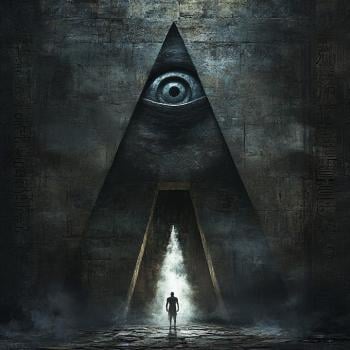
You may have noticed that the title “Bright Morning Star” is used to refer to both Lucifer [Isa. 14] and to Jesus [Rev. 2; 22:1-15, 2 Pet. 1:19] in the Bible. So, which is it?
First, let’s examine the Isaiah passage since this is, chronologically, the first reference we find to the “Bright Morning Star” in the Bible. This is the passage where the term is applied to Lucifer.
For example:
“How you have fallen from heaven,
O star of the morning, son of the dawn!
You have been cut down to the earth,
You who have weakened the nations!
“But you said in your heart,
‘I will ascend to heaven;
I will raise my throne above the stars of God,
And I will sit on the mount of assembly
In the recesses of the north.
‘I will ascend above the heights of the clouds;
I will make myself like the Most High.’
“Nevertheless you will be thrust down to Sheol,
To the recesses of the pit.
“Those who see you will gaze at you,
They will ponder over you, saying,
‘Is this the man who made the earth tremble,
Who shook kingdoms…” [Isaiah 14:12-16]
There are a couple of things we need to point out here in this passage. First, the word “Lucifer” does NOT appear anywhere in the entire chapter. At least, not in the most reliable translations we have.
So, where did Lucifer get connected to this person in Isaiah 14? That would be our friend King James where we read:
“How art thou fallen from heaven, O Lucifer, son of the morning! how art thou cut down to the ground, which didst weaken the nations!” [Is. 14:12, KJV]
What’s fascinating is that the Hebrew word “heylel” is what the KJV crew translated as “Lucifer” as if it were someone’s name, but that’s not what the word means. This is why later [and more accurate] English translations of this passage say:
“How you have fallen from heaven,
O star of the morning, son of the dawn!” [Is. 14:12, NASB]
The term “Lucifer” is the Latin word for “light-bringer” or “morning star” and translators appear to have confused that terminology with someone’s name. The rest is history.
So, if “heylel” is not someone’s name, what does it really mean? Well, according to the Hebrew lexicon, the term is best translated as “bright”, not “Lucifer.”
Secondly – and this is pretty important if you ask me – even if we believed the name/term “Lucifer” actually did belong in this passage, we need to notice that this part of the chapter is addressing the King of Babylon, and the verses after these address the nation of Assyria, and after that the nation of Philistia. So, in context, this chapter is not about Satan or Lucifer at all. It’s a series of warnings to Babylon, Assyria, and Philistia, respectively.
Also, we need to note that it is not “Lucifer” who is called the “King of Babylon” [as if “King of Babylon” were some sort of metaphor for Satan], but it is the “King of Babylon” who is being addressed and [perhaps] referred to as “Lucifer” [at least in the KJV translation].
This is significant: Lucifer is not called the King of Babylon. It’s the King of Babylon who is being compared to Lucifer [at least in the KJV]. So, we’re not talking to or about Satan/Lucifer here. We’re reading a warning from God to the King of Babylon. Period.
Now, we should probably also mention that the term “Lucifer” appears only once in the entire Bible. This is only in the KJV translation, by the way. So, “Lucifer” is not a scriptural name for Satan. It’s the Latin term for “morning star.”
Hopefully we’ve made that point.
Next, we need to look at the other 3 references in the New Testament for Jesus as the “Bright Morning Star” and these are found here:
“So we have the prophetic word made more sure, to which you do well to pay attention as to a lamp shining in a dark place until the day dawns and the morning star [Christ] arises in your hearts.” [2 Pet. 1:19]
“I, Jesus, have sent My angel to testify to you these things for the churches. I am the root and the descendant of David, the bright morning star.” [Rev. 22:16]
“…as I [Jesus] also have received authority from My Father, and I will give him [who overcomes] the morning star.” [Rev. 2:27-28]
Bottom line: the Greek word “phosphoros” used in these passages is the “Morning Star” – literally the planet Venus as seen before the dawn – is identified with Jesus.
In the New Testament, every association with the “Morning Star” is always a good one and the only person ever identified with the Bright Morning Star is Christ. Period.
So, in conclusion, the Bible never equates the “Morning Star” with Satan. Lucifer is not a reference to Satan. It’s the Latin term for “Morning Star.” The Isaiah passage is a warning to the person who was the King of Babylon at the time. His name wasn’t “Lucifer.” The passage poetically describes this human king as someone who believed he could ascend to the heavens, but will soon be brought low and humbled.
Jesus, according to the New Testament, is the “Bright Morning Star” who will rise, shine, and illuminate our hearts with truth.
Satan is not Lucifer. Lucifer is not the Bright Morning Star. Jesus is.
Case closed.
**
Keith Giles and his wife, Wendy, work with Peace Catalyst International to help build relationships between Christians and Muslims in El Paso, TX. Keith was formerly a licensed and ordained minister who walked away from organized church over a decade ago to start a home fellowship that gave away 100% of the offering to the poor in the community. Today he is the author of several best-selling books, including “Jesus Undefeated: Condemning the False Doctrine of Eternal Torment” which is available now on Amazon.

















